Analysis of Professional Ethics in Accounting and Finance Practices
VerifiedAdded on 2020/10/22
|14
|4526
|301
Report
AI Summary
This report delves into the crucial aspects of professional ethics within the accounting and finance sector. It begins by outlining the fundamental principles of ethical behavior, emphasizing integrity, objectivity, and confidentiality. The report then explores the relevant legal, regulatory, and ethical requirements affecting the sector, including civil and criminal law, and the role of regulatory bodies like the SEC. It highlights the importance of adhering to codes of conduct and the risks associated with improper practices, emphasizing the need for vigilance. The report further discusses ethical conduct with clients, suppliers, and colleagues, stressing the importance of objectivity and maintaining a professional distance. It covers organizational values, reporting procedures for unethical behavior, and strategies to prevent ethical conflicts. Finally, the report examines the significance of an ethical approach to sustainability and the responsibilities of finance professionals in upholding sustainability principles. The report provides a comprehensive overview of ethical considerations, offering valuable insights for professionals in the field.
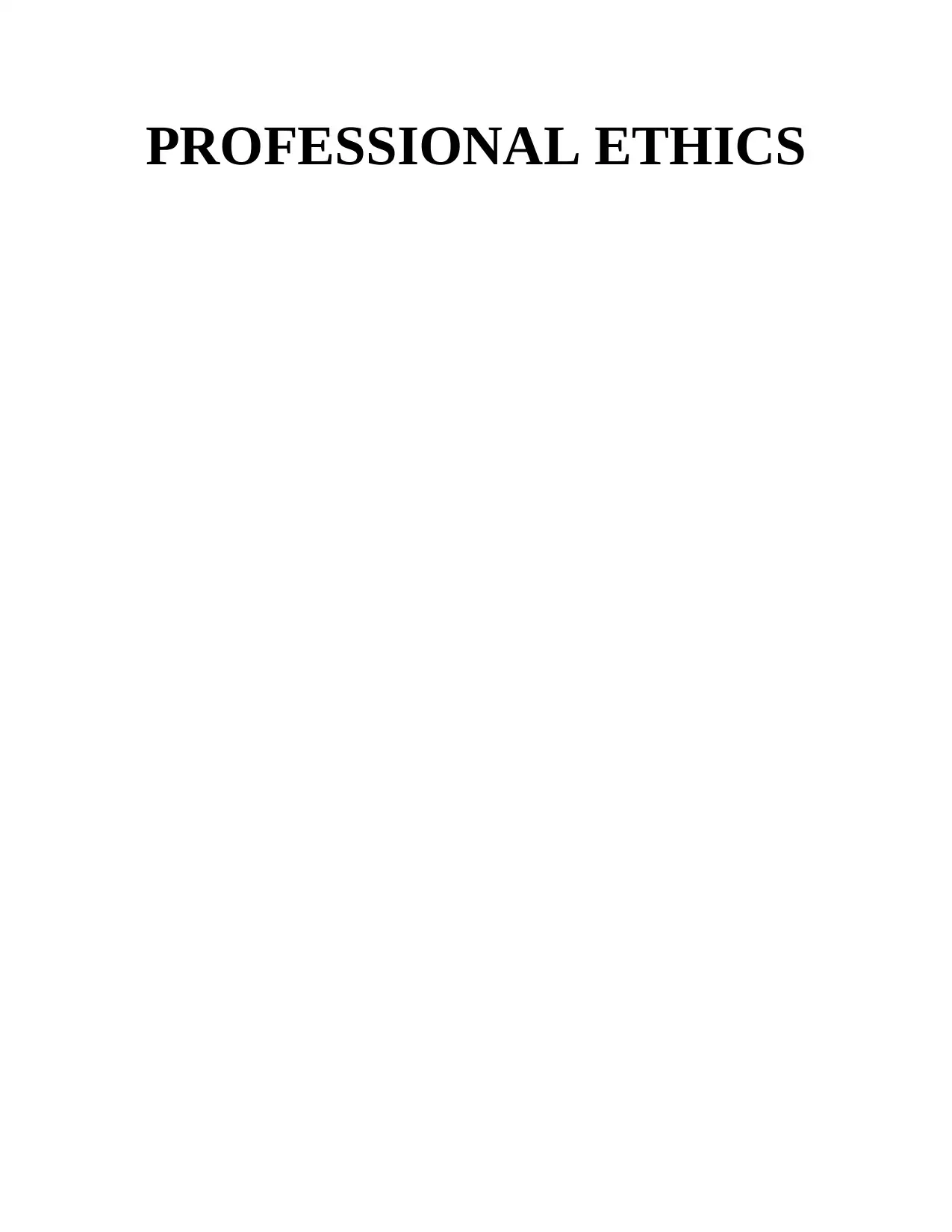
PROFESSIONAL ETHICS
Paraphrase This Document
Need a fresh take? Get an instant paraphrase of this document with our AI Paraphraser
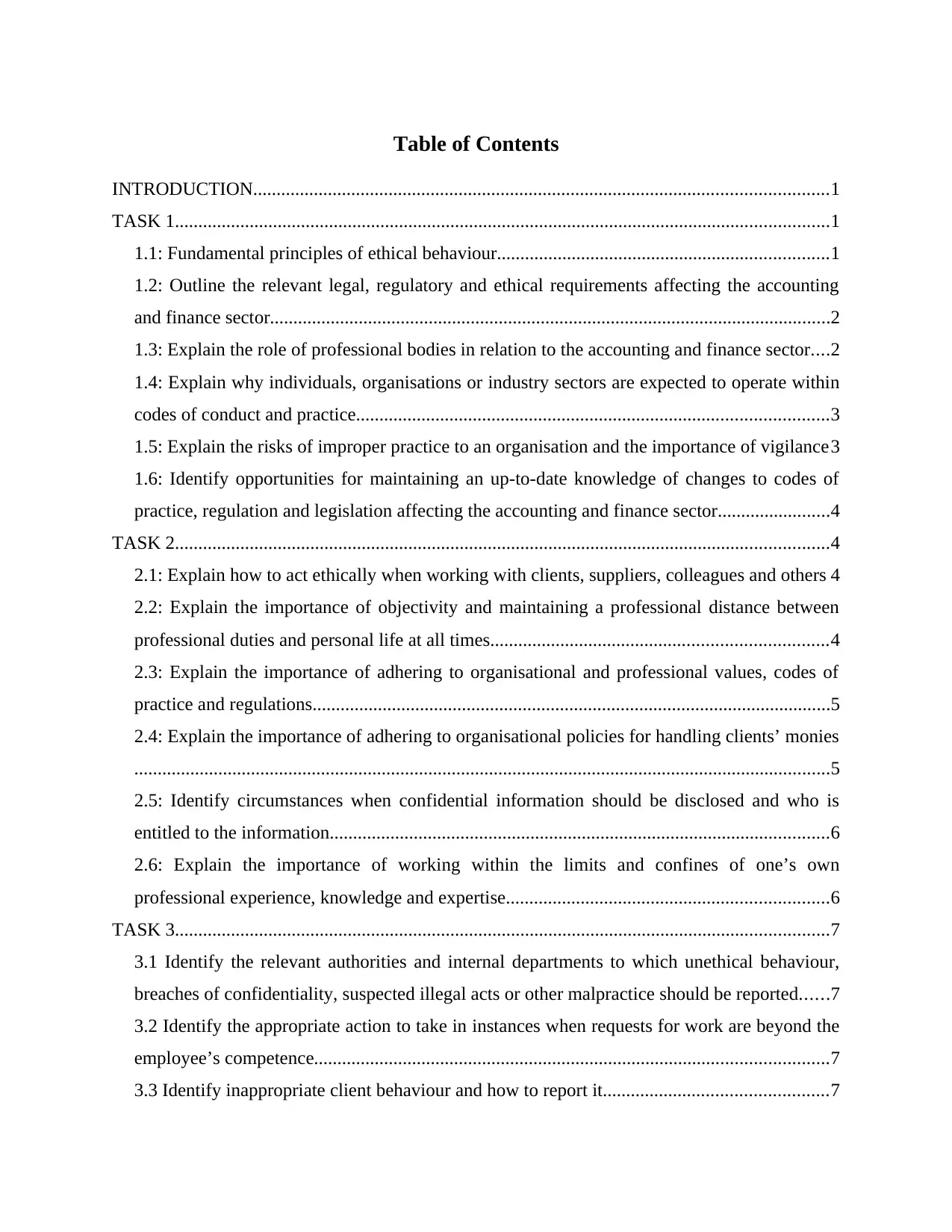
Table of Contents
INTRODUCTION...........................................................................................................................1
TASK 1............................................................................................................................................1
1.1: Fundamental principles of ethical behaviour.......................................................................1
1.2: Outline the relevant legal, regulatory and ethical requirements affecting the accounting
and finance sector........................................................................................................................2
1.3: Explain the role of professional bodies in relation to the accounting and finance sector....2
1.4: Explain why individuals, organisations or industry sectors are expected to operate within
codes of conduct and practice.....................................................................................................3
1.5: Explain the risks of improper practice to an organisation and the importance of vigilance3
1.6: Identify opportunities for maintaining an up-to-date knowledge of changes to codes of
practice, regulation and legislation affecting the accounting and finance sector........................4
TASK 2............................................................................................................................................4
2.1: Explain how to act ethically when working with clients, suppliers, colleagues and others 4
2.2: Explain the importance of objectivity and maintaining a professional distance between
professional duties and personal life at all times........................................................................4
2.3: Explain the importance of adhering to organisational and professional values, codes of
practice and regulations...............................................................................................................5
2.4: Explain the importance of adhering to organisational policies for handling clients’ monies
.....................................................................................................................................................5
2.5: Identify circumstances when confidential information should be disclosed and who is
entitled to the information...........................................................................................................6
2.6: Explain the importance of working within the limits and confines of one’s own
professional experience, knowledge and expertise.....................................................................6
TASK 3............................................................................................................................................7
3.1 Identify the relevant authorities and internal departments to which unethical behaviour,
breaches of confidentiality, suspected illegal acts or other malpractice should be reported......7
3.2 Identify the appropriate action to take in instances when requests for work are beyond the
employee’s competence..............................................................................................................7
3.3 Identify inappropriate client behaviour and how to report it................................................7
INTRODUCTION...........................................................................................................................1
TASK 1............................................................................................................................................1
1.1: Fundamental principles of ethical behaviour.......................................................................1
1.2: Outline the relevant legal, regulatory and ethical requirements affecting the accounting
and finance sector........................................................................................................................2
1.3: Explain the role of professional bodies in relation to the accounting and finance sector....2
1.4: Explain why individuals, organisations or industry sectors are expected to operate within
codes of conduct and practice.....................................................................................................3
1.5: Explain the risks of improper practice to an organisation and the importance of vigilance3
1.6: Identify opportunities for maintaining an up-to-date knowledge of changes to codes of
practice, regulation and legislation affecting the accounting and finance sector........................4
TASK 2............................................................................................................................................4
2.1: Explain how to act ethically when working with clients, suppliers, colleagues and others 4
2.2: Explain the importance of objectivity and maintaining a professional distance between
professional duties and personal life at all times........................................................................4
2.3: Explain the importance of adhering to organisational and professional values, codes of
practice and regulations...............................................................................................................5
2.4: Explain the importance of adhering to organisational policies for handling clients’ monies
.....................................................................................................................................................5
2.5: Identify circumstances when confidential information should be disclosed and who is
entitled to the information...........................................................................................................6
2.6: Explain the importance of working within the limits and confines of one’s own
professional experience, knowledge and expertise.....................................................................6
TASK 3............................................................................................................................................7
3.1 Identify the relevant authorities and internal departments to which unethical behaviour,
breaches of confidentiality, suspected illegal acts or other malpractice should be reported......7
3.2 Identify the appropriate action to take in instances when requests for work are beyond the
employee’s competence..............................................................................................................7
3.3 Identify inappropriate client behaviour and how to report it................................................7
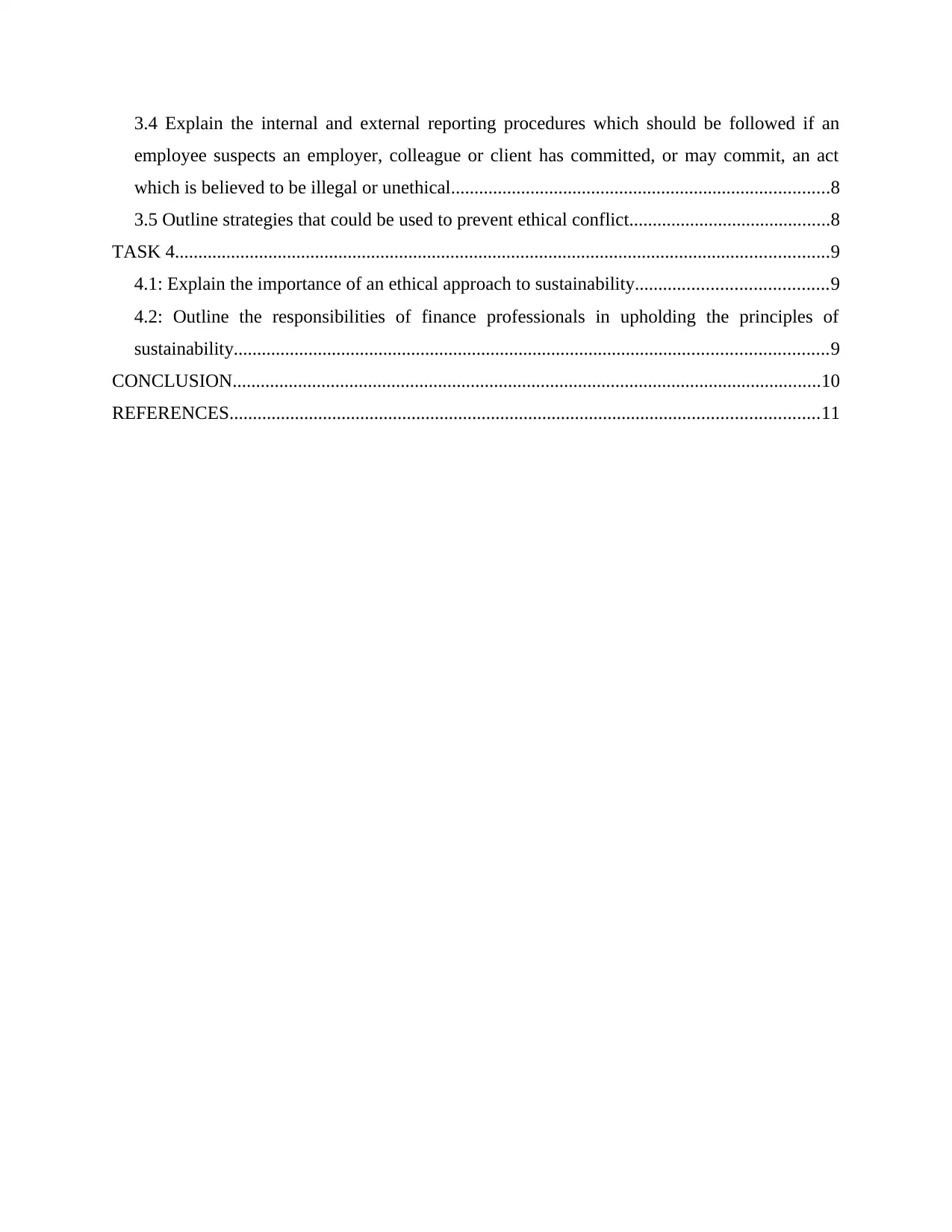
3.4 Explain the internal and external reporting procedures which should be followed if an
employee suspects an employer, colleague or client has committed, or may commit, an act
which is believed to be illegal or unethical.................................................................................8
3.5 Outline strategies that could be used to prevent ethical conflict...........................................8
TASK 4............................................................................................................................................9
4.1: Explain the importance of an ethical approach to sustainability.........................................9
4.2: Outline the responsibilities of finance professionals in upholding the principles of
sustainability...............................................................................................................................9
CONCLUSION..............................................................................................................................10
REFERENCES..............................................................................................................................11
employee suspects an employer, colleague or client has committed, or may commit, an act
which is believed to be illegal or unethical.................................................................................8
3.5 Outline strategies that could be used to prevent ethical conflict...........................................8
TASK 4............................................................................................................................................9
4.1: Explain the importance of an ethical approach to sustainability.........................................9
4.2: Outline the responsibilities of finance professionals in upholding the principles of
sustainability...............................................................................................................................9
CONCLUSION..............................................................................................................................10
REFERENCES..............................................................................................................................11
⊘ This is a preview!⊘
Do you want full access?
Subscribe today to unlock all pages.

Trusted by 1+ million students worldwide
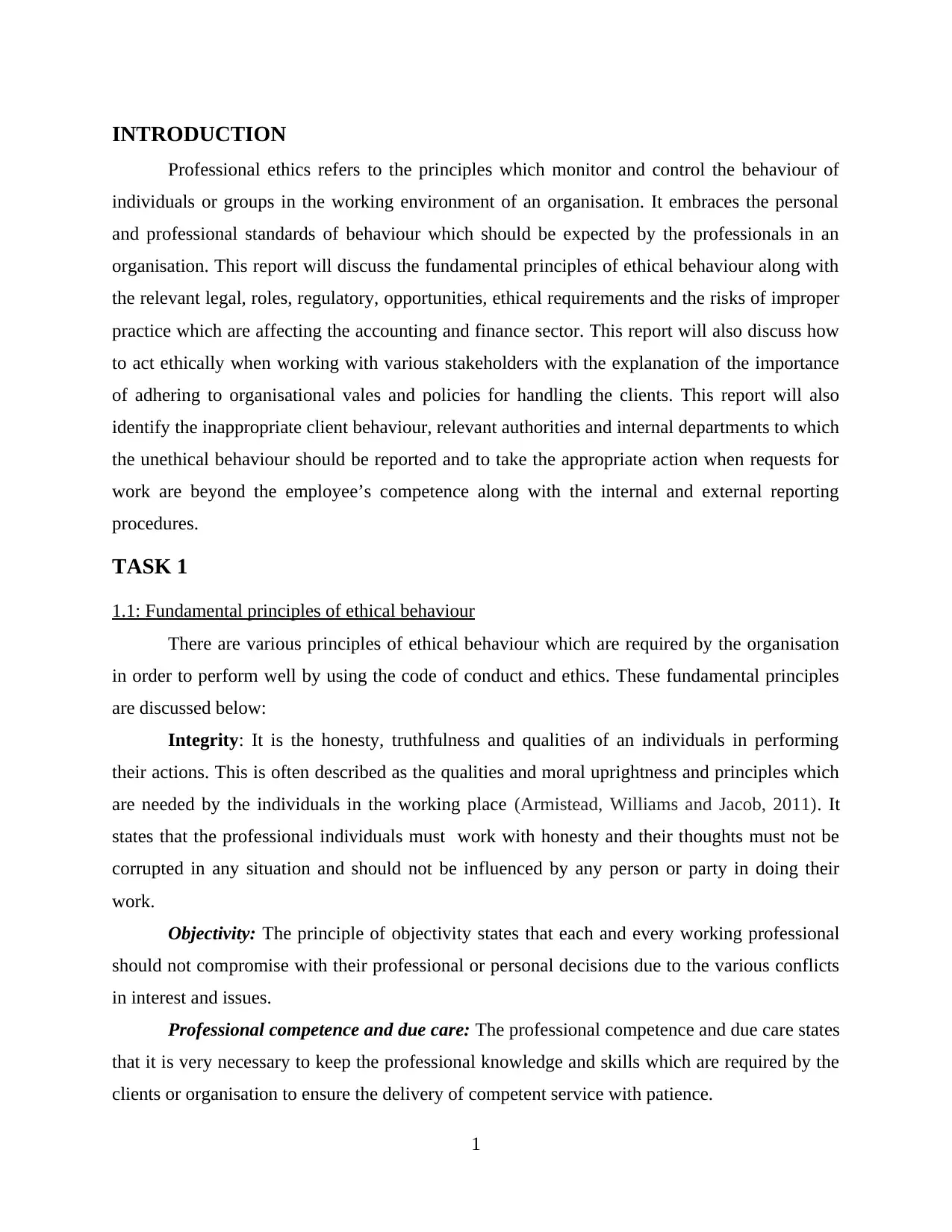
INTRODUCTION
Professional ethics refers to the principles which monitor and control the behaviour of
individuals or groups in the working environment of an organisation. It embraces the personal
and professional standards of behaviour which should be expected by the professionals in an
organisation. This report will discuss the fundamental principles of ethical behaviour along with
the relevant legal, roles, regulatory, opportunities, ethical requirements and the risks of improper
practice which are affecting the accounting and finance sector. This report will also discuss how
to act ethically when working with various stakeholders with the explanation of the importance
of adhering to organisational vales and policies for handling the clients. This report will also
identify the inappropriate client behaviour, relevant authorities and internal departments to which
the unethical behaviour should be reported and to take the appropriate action when requests for
work are beyond the employee’s competence along with the internal and external reporting
procedures.
TASK 1
1.1: Fundamental principles of ethical behaviour
There are various principles of ethical behaviour which are required by the organisation
in order to perform well by using the code of conduct and ethics. These fundamental principles
are discussed below:
Integrity: It is the honesty, truthfulness and qualities of an individuals in performing
their actions. This is often described as the qualities and moral uprightness and principles which
are needed by the individuals in the working place (Armistead, Williams and Jacob, 2011). It
states that the professional individuals must work with honesty and their thoughts must not be
corrupted in any situation and should not be influenced by any person or party in doing their
work.
Objectivity: The principle of objectivity states that each and every working professional
should not compromise with their professional or personal decisions due to the various conflicts
in interest and issues.
Professional competence and due care: The professional competence and due care states
that it is very necessary to keep the professional knowledge and skills which are required by the
clients or organisation to ensure the delivery of competent service with patience.
1
Professional ethics refers to the principles which monitor and control the behaviour of
individuals or groups in the working environment of an organisation. It embraces the personal
and professional standards of behaviour which should be expected by the professionals in an
organisation. This report will discuss the fundamental principles of ethical behaviour along with
the relevant legal, roles, regulatory, opportunities, ethical requirements and the risks of improper
practice which are affecting the accounting and finance sector. This report will also discuss how
to act ethically when working with various stakeholders with the explanation of the importance
of adhering to organisational vales and policies for handling the clients. This report will also
identify the inappropriate client behaviour, relevant authorities and internal departments to which
the unethical behaviour should be reported and to take the appropriate action when requests for
work are beyond the employee’s competence along with the internal and external reporting
procedures.
TASK 1
1.1: Fundamental principles of ethical behaviour
There are various principles of ethical behaviour which are required by the organisation
in order to perform well by using the code of conduct and ethics. These fundamental principles
are discussed below:
Integrity: It is the honesty, truthfulness and qualities of an individuals in performing
their actions. This is often described as the qualities and moral uprightness and principles which
are needed by the individuals in the working place (Armistead, Williams and Jacob, 2011). It
states that the professional individuals must work with honesty and their thoughts must not be
corrupted in any situation and should not be influenced by any person or party in doing their
work.
Objectivity: The principle of objectivity states that each and every working professional
should not compromise with their professional or personal decisions due to the various conflicts
in interest and issues.
Professional competence and due care: The professional competence and due care states
that it is very necessary to keep the professional knowledge and skills which are required by the
clients or organisation to ensure the delivery of competent service with patience.
1
Paraphrase This Document
Need a fresh take? Get an instant paraphrase of this document with our AI Paraphraser
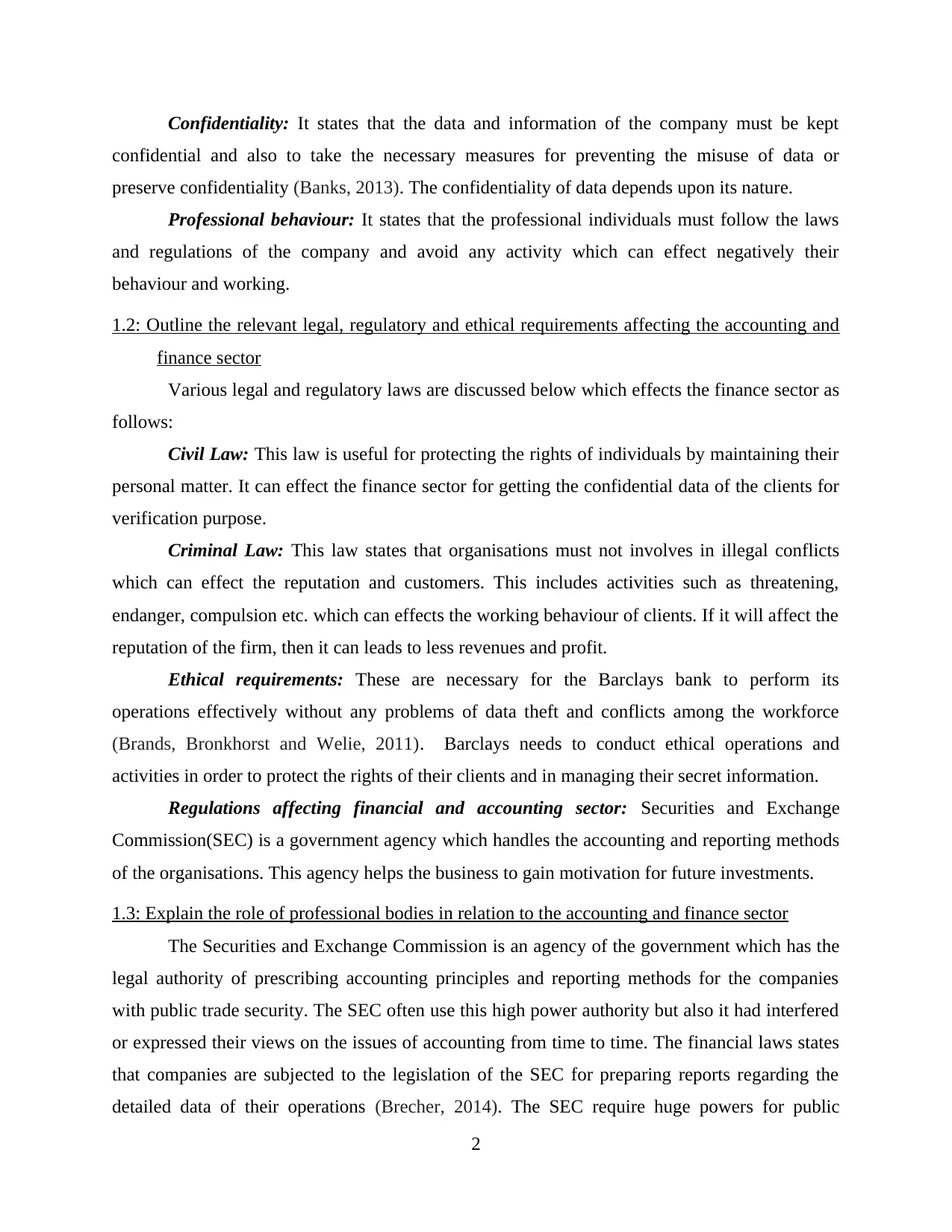
Confidentiality: It states that the data and information of the company must be kept
confidential and also to take the necessary measures for preventing the misuse of data or
preserve confidentiality (Banks, 2013). The confidentiality of data depends upon its nature.
Professional behaviour: It states that the professional individuals must follow the laws
and regulations of the company and avoid any activity which can effect negatively their
behaviour and working.
1.2: Outline the relevant legal, regulatory and ethical requirements affecting the accounting and
finance sector
Various legal and regulatory laws are discussed below which effects the finance sector as
follows:
Civil Law: This law is useful for protecting the rights of individuals by maintaining their
personal matter. It can effect the finance sector for getting the confidential data of the clients for
verification purpose.
Criminal Law: This law states that organisations must not involves in illegal conflicts
which can effect the reputation and customers. This includes activities such as threatening,
endanger, compulsion etc. which can effects the working behaviour of clients. If it will affect the
reputation of the firm, then it can leads to less revenues and profit.
Ethical requirements: These are necessary for the Barclays bank to perform its
operations effectively without any problems of data theft and conflicts among the workforce
(Brands, Bronkhorst and Welie, 2011). Barclays needs to conduct ethical operations and
activities in order to protect the rights of their clients and in managing their secret information.
Regulations affecting financial and accounting sector: Securities and Exchange
Commission(SEC) is a government agency which handles the accounting and reporting methods
of the organisations. This agency helps the business to gain motivation for future investments.
1.3: Explain the role of professional bodies in relation to the accounting and finance sector
The Securities and Exchange Commission is an agency of the government which has the
legal authority of prescribing accounting principles and reporting methods for the companies
with public trade security. The SEC often use this high power authority but also it had interfered
or expressed their views on the issues of accounting from time to time. The financial laws states
that companies are subjected to the legislation of the SEC for preparing reports regarding the
detailed data of their operations (Brecher, 2014). The SEC require huge powers for public
2
confidential and also to take the necessary measures for preventing the misuse of data or
preserve confidentiality (Banks, 2013). The confidentiality of data depends upon its nature.
Professional behaviour: It states that the professional individuals must follow the laws
and regulations of the company and avoid any activity which can effect negatively their
behaviour and working.
1.2: Outline the relevant legal, regulatory and ethical requirements affecting the accounting and
finance sector
Various legal and regulatory laws are discussed below which effects the finance sector as
follows:
Civil Law: This law is useful for protecting the rights of individuals by maintaining their
personal matter. It can effect the finance sector for getting the confidential data of the clients for
verification purpose.
Criminal Law: This law states that organisations must not involves in illegal conflicts
which can effect the reputation and customers. This includes activities such as threatening,
endanger, compulsion etc. which can effects the working behaviour of clients. If it will affect the
reputation of the firm, then it can leads to less revenues and profit.
Ethical requirements: These are necessary for the Barclays bank to perform its
operations effectively without any problems of data theft and conflicts among the workforce
(Brands, Bronkhorst and Welie, 2011). Barclays needs to conduct ethical operations and
activities in order to protect the rights of their clients and in managing their secret information.
Regulations affecting financial and accounting sector: Securities and Exchange
Commission(SEC) is a government agency which handles the accounting and reporting methods
of the organisations. This agency helps the business to gain motivation for future investments.
1.3: Explain the role of professional bodies in relation to the accounting and finance sector
The Securities and Exchange Commission is an agency of the government which has the
legal authority of prescribing accounting principles and reporting methods for the companies
with public trade security. The SEC often use this high power authority but also it had interfered
or expressed their views on the issues of accounting from time to time. The financial laws states
that companies are subjected to the legislation of the SEC for preparing reports regarding the
detailed data of their operations (Brecher, 2014). The SEC require huge powers for public
2
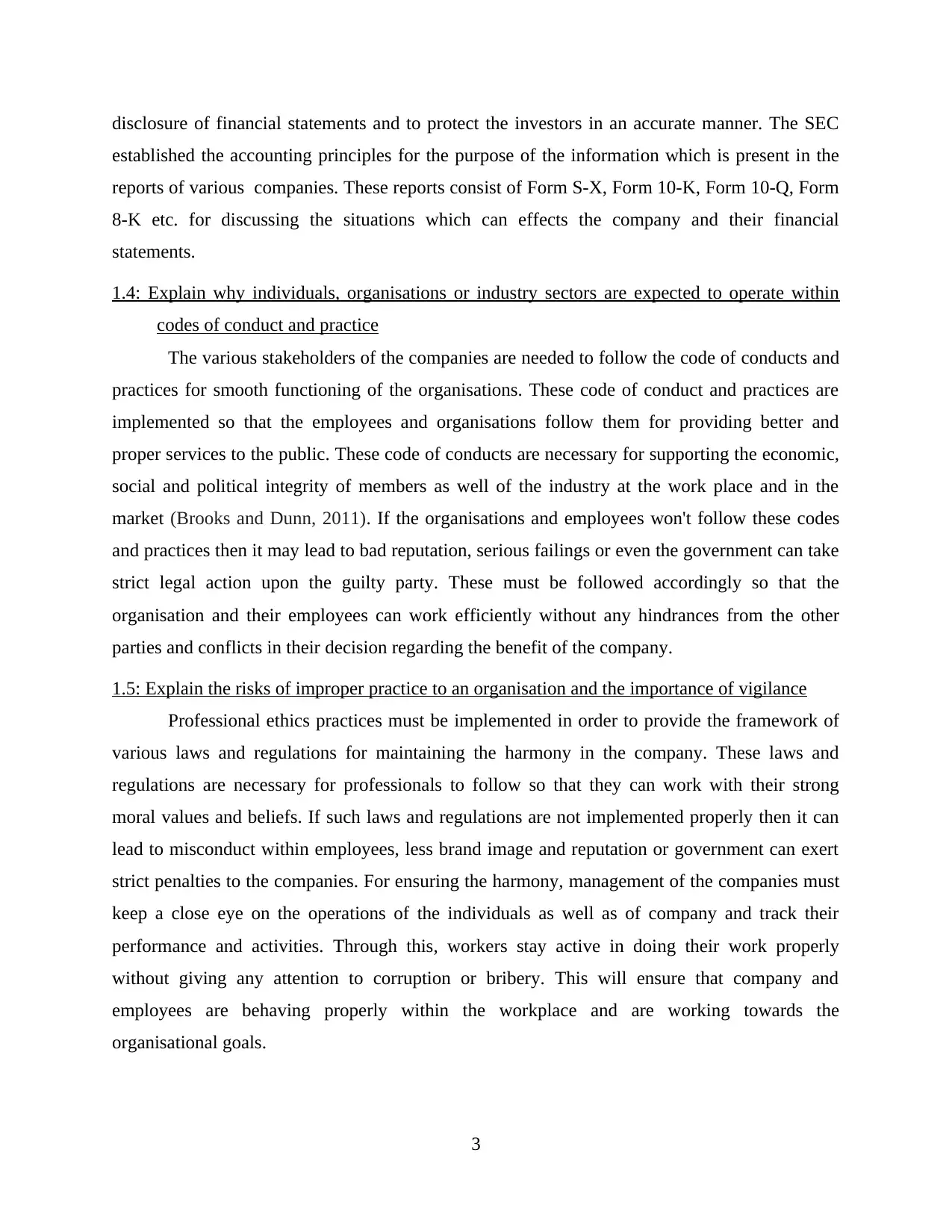
disclosure of financial statements and to protect the investors in an accurate manner. The SEC
established the accounting principles for the purpose of the information which is present in the
reports of various companies. These reports consist of Form S-X, Form 10-K, Form 10-Q, Form
8-K etc. for discussing the situations which can effects the company and their financial
statements.
1.4: Explain why individuals, organisations or industry sectors are expected to operate within
codes of conduct and practice
The various stakeholders of the companies are needed to follow the code of conducts and
practices for smooth functioning of the organisations. These code of conduct and practices are
implemented so that the employees and organisations follow them for providing better and
proper services to the public. These code of conducts are necessary for supporting the economic,
social and political integrity of members as well of the industry at the work place and in the
market (Brooks and Dunn, 2011). If the organisations and employees won't follow these codes
and practices then it may lead to bad reputation, serious failings or even the government can take
strict legal action upon the guilty party. These must be followed accordingly so that the
organisation and their employees can work efficiently without any hindrances from the other
parties and conflicts in their decision regarding the benefit of the company.
1.5: Explain the risks of improper practice to an organisation and the importance of vigilance
Professional ethics practices must be implemented in order to provide the framework of
various laws and regulations for maintaining the harmony in the company. These laws and
regulations are necessary for professionals to follow so that they can work with their strong
moral values and beliefs. If such laws and regulations are not implemented properly then it can
lead to misconduct within employees, less brand image and reputation or government can exert
strict penalties to the companies. For ensuring the harmony, management of the companies must
keep a close eye on the operations of the individuals as well as of company and track their
performance and activities. Through this, workers stay active in doing their work properly
without giving any attention to corruption or bribery. This will ensure that company and
employees are behaving properly within the workplace and are working towards the
organisational goals.
3
established the accounting principles for the purpose of the information which is present in the
reports of various companies. These reports consist of Form S-X, Form 10-K, Form 10-Q, Form
8-K etc. for discussing the situations which can effects the company and their financial
statements.
1.4: Explain why individuals, organisations or industry sectors are expected to operate within
codes of conduct and practice
The various stakeholders of the companies are needed to follow the code of conducts and
practices for smooth functioning of the organisations. These code of conduct and practices are
implemented so that the employees and organisations follow them for providing better and
proper services to the public. These code of conducts are necessary for supporting the economic,
social and political integrity of members as well of the industry at the work place and in the
market (Brooks and Dunn, 2011). If the organisations and employees won't follow these codes
and practices then it may lead to bad reputation, serious failings or even the government can take
strict legal action upon the guilty party. These must be followed accordingly so that the
organisation and their employees can work efficiently without any hindrances from the other
parties and conflicts in their decision regarding the benefit of the company.
1.5: Explain the risks of improper practice to an organisation and the importance of vigilance
Professional ethics practices must be implemented in order to provide the framework of
various laws and regulations for maintaining the harmony in the company. These laws and
regulations are necessary for professionals to follow so that they can work with their strong
moral values and beliefs. If such laws and regulations are not implemented properly then it can
lead to misconduct within employees, less brand image and reputation or government can exert
strict penalties to the companies. For ensuring the harmony, management of the companies must
keep a close eye on the operations of the individuals as well as of company and track their
performance and activities. Through this, workers stay active in doing their work properly
without giving any attention to corruption or bribery. This will ensure that company and
employees are behaving properly within the workplace and are working towards the
organisational goals.
3
⊘ This is a preview!⊘
Do you want full access?
Subscribe today to unlock all pages.

Trusted by 1+ million students worldwide
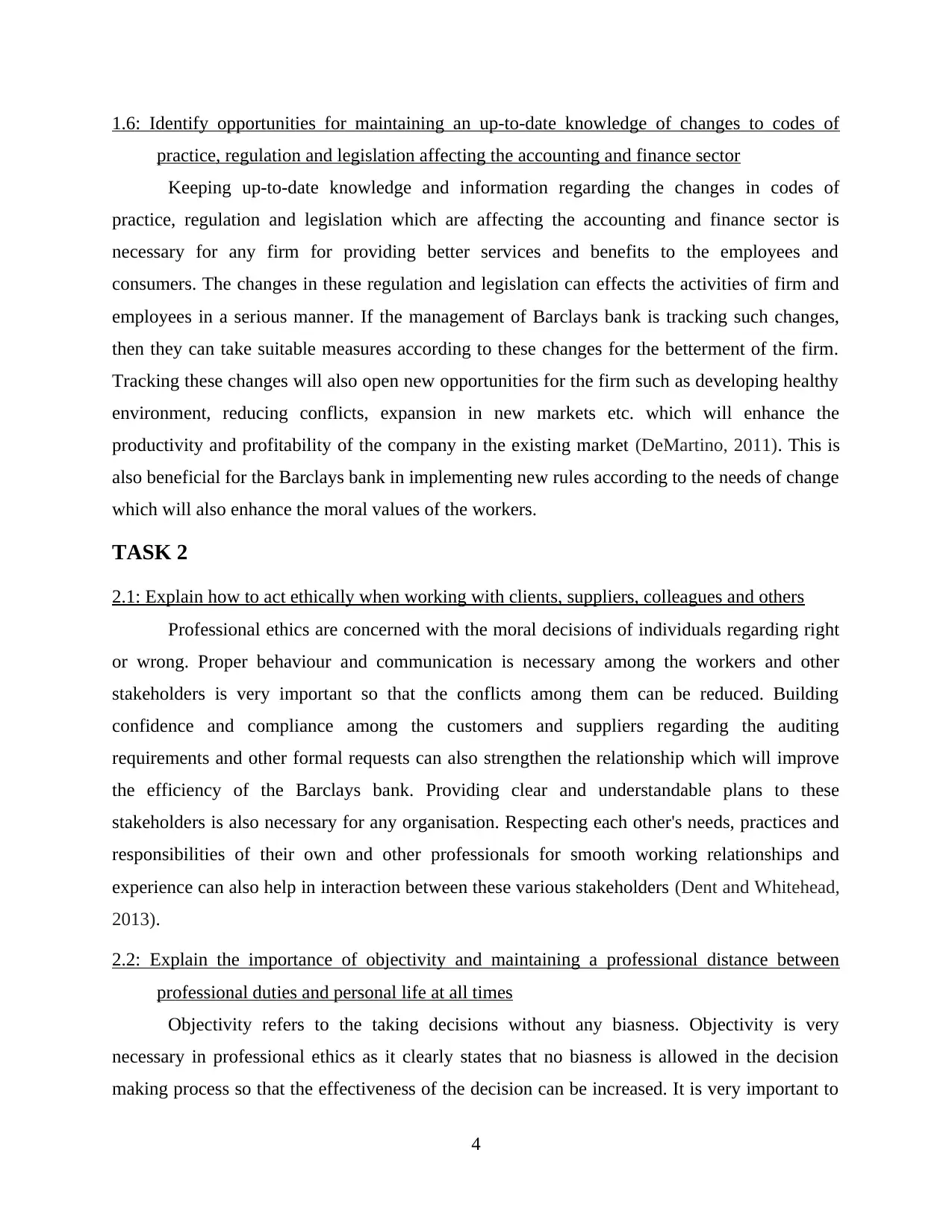
1.6: Identify opportunities for maintaining an up-to-date knowledge of changes to codes of
practice, regulation and legislation affecting the accounting and finance sector
Keeping up-to-date knowledge and information regarding the changes in codes of
practice, regulation and legislation which are affecting the accounting and finance sector is
necessary for any firm for providing better services and benefits to the employees and
consumers. The changes in these regulation and legislation can effects the activities of firm and
employees in a serious manner. If the management of Barclays bank is tracking such changes,
then they can take suitable measures according to these changes for the betterment of the firm.
Tracking these changes will also open new opportunities for the firm such as developing healthy
environment, reducing conflicts, expansion in new markets etc. which will enhance the
productivity and profitability of the company in the existing market (DeMartino, 2011). This is
also beneficial for the Barclays bank in implementing new rules according to the needs of change
which will also enhance the moral values of the workers.
TASK 2
2.1: Explain how to act ethically when working with clients, suppliers, colleagues and others
Professional ethics are concerned with the moral decisions of individuals regarding right
or wrong. Proper behaviour and communication is necessary among the workers and other
stakeholders is very important so that the conflicts among them can be reduced. Building
confidence and compliance among the customers and suppliers regarding the auditing
requirements and other formal requests can also strengthen the relationship which will improve
the efficiency of the Barclays bank. Providing clear and understandable plans to these
stakeholders is also necessary for any organisation. Respecting each other's needs, practices and
responsibilities of their own and other professionals for smooth working relationships and
experience can also help in interaction between these various stakeholders (Dent and Whitehead,
2013).
2.2: Explain the importance of objectivity and maintaining a professional distance between
professional duties and personal life at all times
Objectivity refers to the taking decisions without any biasness. Objectivity is very
necessary in professional ethics as it clearly states that no biasness is allowed in the decision
making process so that the effectiveness of the decision can be increased. It is very important to
4
practice, regulation and legislation affecting the accounting and finance sector
Keeping up-to-date knowledge and information regarding the changes in codes of
practice, regulation and legislation which are affecting the accounting and finance sector is
necessary for any firm for providing better services and benefits to the employees and
consumers. The changes in these regulation and legislation can effects the activities of firm and
employees in a serious manner. If the management of Barclays bank is tracking such changes,
then they can take suitable measures according to these changes for the betterment of the firm.
Tracking these changes will also open new opportunities for the firm such as developing healthy
environment, reducing conflicts, expansion in new markets etc. which will enhance the
productivity and profitability of the company in the existing market (DeMartino, 2011). This is
also beneficial for the Barclays bank in implementing new rules according to the needs of change
which will also enhance the moral values of the workers.
TASK 2
2.1: Explain how to act ethically when working with clients, suppliers, colleagues and others
Professional ethics are concerned with the moral decisions of individuals regarding right
or wrong. Proper behaviour and communication is necessary among the workers and other
stakeholders is very important so that the conflicts among them can be reduced. Building
confidence and compliance among the customers and suppliers regarding the auditing
requirements and other formal requests can also strengthen the relationship which will improve
the efficiency of the Barclays bank. Providing clear and understandable plans to these
stakeholders is also necessary for any organisation. Respecting each other's needs, practices and
responsibilities of their own and other professionals for smooth working relationships and
experience can also help in interaction between these various stakeholders (Dent and Whitehead,
2013).
2.2: Explain the importance of objectivity and maintaining a professional distance between
professional duties and personal life at all times
Objectivity refers to the taking decisions without any biasness. Objectivity is very
necessary in professional ethics as it clearly states that no biasness is allowed in the decision
making process so that the effectiveness of the decision can be increased. It is very important to
4
Paraphrase This Document
Need a fresh take? Get an instant paraphrase of this document with our AI Paraphraser
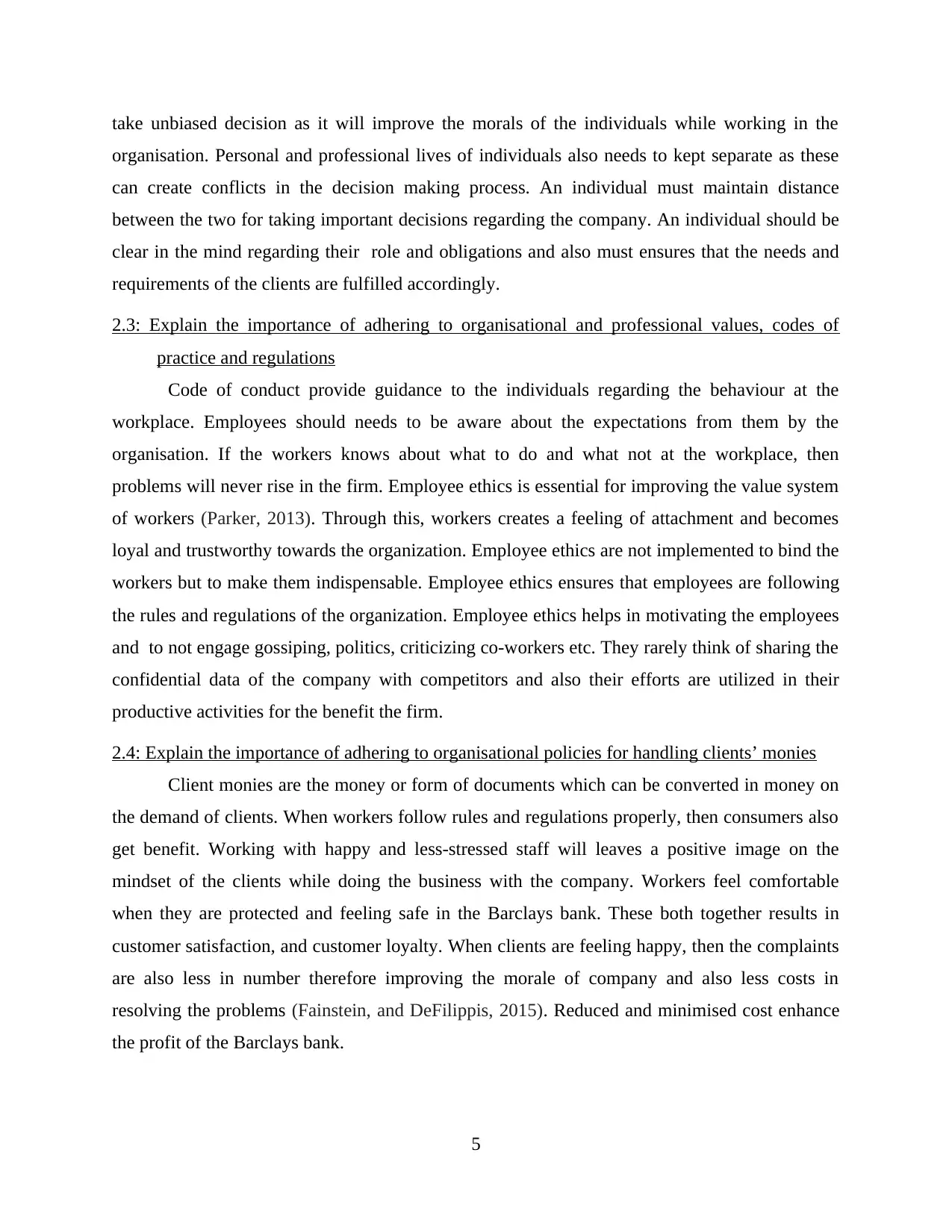
take unbiased decision as it will improve the morals of the individuals while working in the
organisation. Personal and professional lives of individuals also needs to kept separate as these
can create conflicts in the decision making process. An individual must maintain distance
between the two for taking important decisions regarding the company. An individual should be
clear in the mind regarding their role and obligations and also must ensures that the needs and
requirements of the clients are fulfilled accordingly.
2.3: Explain the importance of adhering to organisational and professional values, codes of
practice and regulations
Code of conduct provide guidance to the individuals regarding the behaviour at the
workplace. Employees should needs to be aware about the expectations from them by the
organisation. If the workers knows about what to do and what not at the workplace, then
problems will never rise in the firm. Employee ethics is essential for improving the value system
of workers (Parker, 2013). Through this, workers creates a feeling of attachment and becomes
loyal and trustworthy towards the organization. Employee ethics are not implemented to bind the
workers but to make them indispensable. Employee ethics ensures that employees are following
the rules and regulations of the organization. Employee ethics helps in motivating the employees
and to not engage gossiping, politics, criticizing co-workers etc. They rarely think of sharing the
confidential data of the company with competitors and also their efforts are utilized in their
productive activities for the benefit the firm.
2.4: Explain the importance of adhering to organisational policies for handling clients’ monies
Client monies are the money or form of documents which can be converted in money on
the demand of clients. When workers follow rules and regulations properly, then consumers also
get benefit. Working with happy and less-stressed staff will leaves a positive image on the
mindset of the clients while doing the business with the company. Workers feel comfortable
when they are protected and feeling safe in the Barclays bank. These both together results in
customer satisfaction, and customer loyalty. When clients are feeling happy, then the complaints
are also less in number therefore improving the morale of company and also less costs in
resolving the problems (Fainstein, and DeFilippis, 2015). Reduced and minimised cost enhance
the profit of the Barclays bank.
5
organisation. Personal and professional lives of individuals also needs to kept separate as these
can create conflicts in the decision making process. An individual must maintain distance
between the two for taking important decisions regarding the company. An individual should be
clear in the mind regarding their role and obligations and also must ensures that the needs and
requirements of the clients are fulfilled accordingly.
2.3: Explain the importance of adhering to organisational and professional values, codes of
practice and regulations
Code of conduct provide guidance to the individuals regarding the behaviour at the
workplace. Employees should needs to be aware about the expectations from them by the
organisation. If the workers knows about what to do and what not at the workplace, then
problems will never rise in the firm. Employee ethics is essential for improving the value system
of workers (Parker, 2013). Through this, workers creates a feeling of attachment and becomes
loyal and trustworthy towards the organization. Employee ethics are not implemented to bind the
workers but to make them indispensable. Employee ethics ensures that employees are following
the rules and regulations of the organization. Employee ethics helps in motivating the employees
and to not engage gossiping, politics, criticizing co-workers etc. They rarely think of sharing the
confidential data of the company with competitors and also their efforts are utilized in their
productive activities for the benefit the firm.
2.4: Explain the importance of adhering to organisational policies for handling clients’ monies
Client monies are the money or form of documents which can be converted in money on
the demand of clients. When workers follow rules and regulations properly, then consumers also
get benefit. Working with happy and less-stressed staff will leaves a positive image on the
mindset of the clients while doing the business with the company. Workers feel comfortable
when they are protected and feeling safe in the Barclays bank. These both together results in
customer satisfaction, and customer loyalty. When clients are feeling happy, then the complaints
are also less in number therefore improving the morale of company and also less costs in
resolving the problems (Fainstein, and DeFilippis, 2015). Reduced and minimised cost enhance
the profit of the Barclays bank.
5
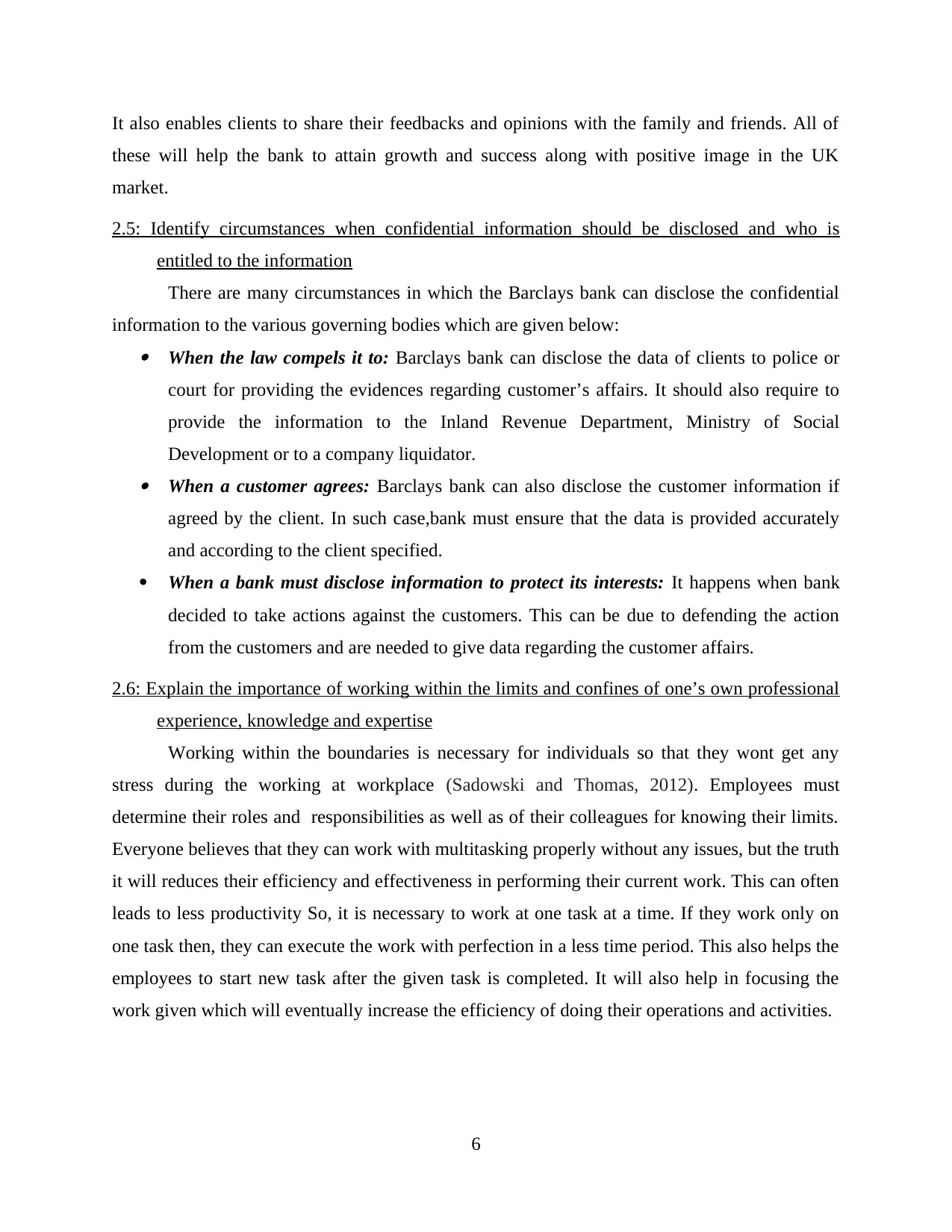
It also enables clients to share their feedbacks and opinions with the family and friends. All of
these will help the bank to attain growth and success along with positive image in the UK
market.
2.5: Identify circumstances when confidential information should be disclosed and who is
entitled to the information
There are many circumstances in which the Barclays bank can disclose the confidential
information to the various governing bodies which are given below: When the law compels it to: Barclays bank can disclose the data of clients to police or
court for providing the evidences regarding customer’s affairs. It should also require to
provide the information to the Inland Revenue Department, Ministry of Social
Development or to a company liquidator. When a customer agrees: Barclays bank can also disclose the customer information if
agreed by the client. In such case,bank must ensure that the data is provided accurately
and according to the client specified.
When a bank must disclose information to protect its interests: It happens when bank
decided to take actions against the customers. This can be due to defending the action
from the customers and are needed to give data regarding the customer affairs.
2.6: Explain the importance of working within the limits and confines of one’s own professional
experience, knowledge and expertise
Working within the boundaries is necessary for individuals so that they wont get any
stress during the working at workplace (Sadowski and Thomas, 2012). Employees must
determine their roles and responsibilities as well as of their colleagues for knowing their limits.
Everyone believes that they can work with multitasking properly without any issues, but the truth
it will reduces their efficiency and effectiveness in performing their current work. This can often
leads to less productivity So, it is necessary to work at one task at a time. If they work only on
one task then, they can execute the work with perfection in a less time period. This also helps the
employees to start new task after the given task is completed. It will also help in focusing the
work given which will eventually increase the efficiency of doing their operations and activities.
6
these will help the bank to attain growth and success along with positive image in the UK
market.
2.5: Identify circumstances when confidential information should be disclosed and who is
entitled to the information
There are many circumstances in which the Barclays bank can disclose the confidential
information to the various governing bodies which are given below: When the law compels it to: Barclays bank can disclose the data of clients to police or
court for providing the evidences regarding customer’s affairs. It should also require to
provide the information to the Inland Revenue Department, Ministry of Social
Development or to a company liquidator. When a customer agrees: Barclays bank can also disclose the customer information if
agreed by the client. In such case,bank must ensure that the data is provided accurately
and according to the client specified.
When a bank must disclose information to protect its interests: It happens when bank
decided to take actions against the customers. This can be due to defending the action
from the customers and are needed to give data regarding the customer affairs.
2.6: Explain the importance of working within the limits and confines of one’s own professional
experience, knowledge and expertise
Working within the boundaries is necessary for individuals so that they wont get any
stress during the working at workplace (Sadowski and Thomas, 2012). Employees must
determine their roles and responsibilities as well as of their colleagues for knowing their limits.
Everyone believes that they can work with multitasking properly without any issues, but the truth
it will reduces their efficiency and effectiveness in performing their current work. This can often
leads to less productivity So, it is necessary to work at one task at a time. If they work only on
one task then, they can execute the work with perfection in a less time period. This also helps the
employees to start new task after the given task is completed. It will also help in focusing the
work given which will eventually increase the efficiency of doing their operations and activities.
6
⊘ This is a preview!⊘
Do you want full access?
Subscribe today to unlock all pages.

Trusted by 1+ million students worldwide
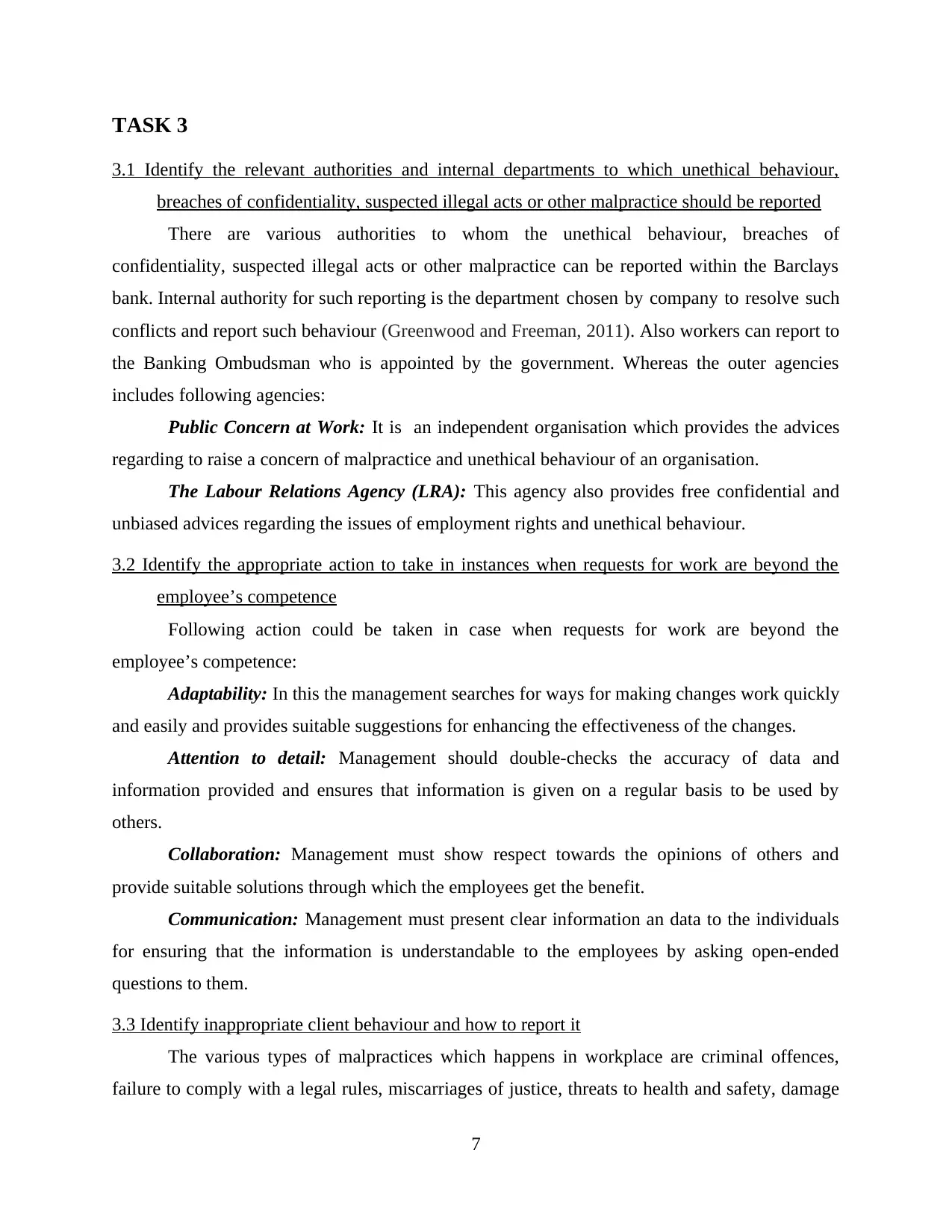
TASK 3
3.1 Identify the relevant authorities and internal departments to which unethical behaviour,
breaches of confidentiality, suspected illegal acts or other malpractice should be reported
There are various authorities to whom the unethical behaviour, breaches of
confidentiality, suspected illegal acts or other malpractice can be reported within the Barclays
bank. Internal authority for such reporting is the department chosen by company to resolve such
conflicts and report such behaviour (Greenwood and Freeman, 2011). Also workers can report to
the Banking Ombudsman who is appointed by the government. Whereas the outer agencies
includes following agencies:
Public Concern at Work: It is an independent organisation which provides the advices
regarding to raise a concern of malpractice and unethical behaviour of an organisation.
The Labour Relations Agency (LRA): This agency also provides free confidential and
unbiased advices regarding the issues of employment rights and unethical behaviour.
3.2 Identify the appropriate action to take in instances when requests for work are beyond the
employee’s competence
Following action could be taken in case when requests for work are beyond the
employee’s competence:
Adaptability: In this the management searches for ways for making changes work quickly
and easily and provides suitable suggestions for enhancing the effectiveness of the changes.
Attention to detail: Management should double-checks the accuracy of data and
information provided and ensures that information is given on a regular basis to be used by
others.
Collaboration: Management must show respect towards the opinions of others and
provide suitable solutions through which the employees get the benefit.
Communication: Management must present clear information an data to the individuals
for ensuring that the information is understandable to the employees by asking open-ended
questions to them.
3.3 Identify inappropriate client behaviour and how to report it
The various types of malpractices which happens in workplace are criminal offences,
failure to comply with a legal rules, miscarriages of justice, threats to health and safety, damage
7
3.1 Identify the relevant authorities and internal departments to which unethical behaviour,
breaches of confidentiality, suspected illegal acts or other malpractice should be reported
There are various authorities to whom the unethical behaviour, breaches of
confidentiality, suspected illegal acts or other malpractice can be reported within the Barclays
bank. Internal authority for such reporting is the department chosen by company to resolve such
conflicts and report such behaviour (Greenwood and Freeman, 2011). Also workers can report to
the Banking Ombudsman who is appointed by the government. Whereas the outer agencies
includes following agencies:
Public Concern at Work: It is an independent organisation which provides the advices
regarding to raise a concern of malpractice and unethical behaviour of an organisation.
The Labour Relations Agency (LRA): This agency also provides free confidential and
unbiased advices regarding the issues of employment rights and unethical behaviour.
3.2 Identify the appropriate action to take in instances when requests for work are beyond the
employee’s competence
Following action could be taken in case when requests for work are beyond the
employee’s competence:
Adaptability: In this the management searches for ways for making changes work quickly
and easily and provides suitable suggestions for enhancing the effectiveness of the changes.
Attention to detail: Management should double-checks the accuracy of data and
information provided and ensures that information is given on a regular basis to be used by
others.
Collaboration: Management must show respect towards the opinions of others and
provide suitable solutions through which the employees get the benefit.
Communication: Management must present clear information an data to the individuals
for ensuring that the information is understandable to the employees by asking open-ended
questions to them.
3.3 Identify inappropriate client behaviour and how to report it
The various types of malpractices which happens in workplace are criminal offences,
failure to comply with a legal rules, miscarriages of justice, threats to health and safety, damage
7
Paraphrase This Document
Need a fresh take? Get an instant paraphrase of this document with our AI Paraphraser
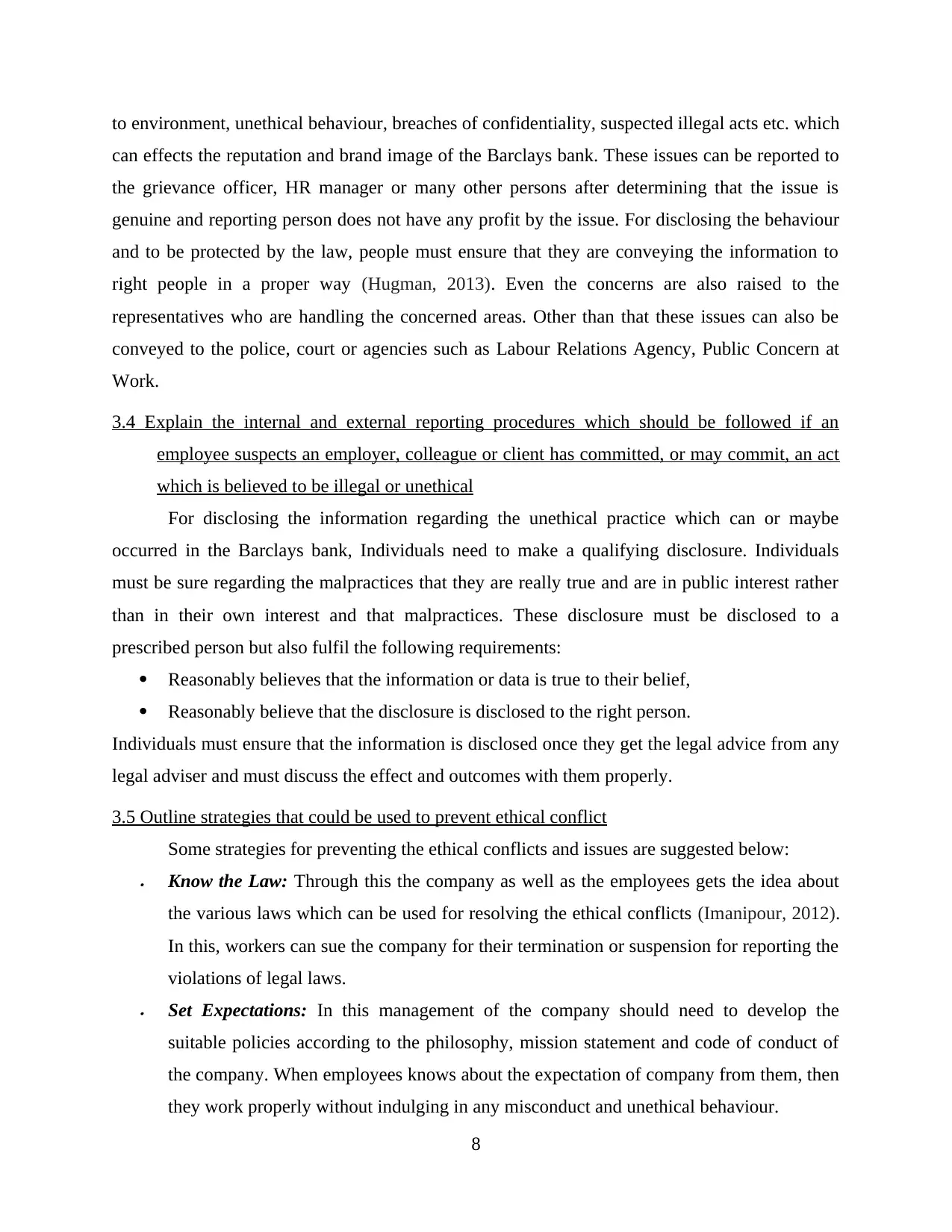
to environment, unethical behaviour, breaches of confidentiality, suspected illegal acts etc. which
can effects the reputation and brand image of the Barclays bank. These issues can be reported to
the grievance officer, HR manager or many other persons after determining that the issue is
genuine and reporting person does not have any profit by the issue. For disclosing the behaviour
and to be protected by the law, people must ensure that they are conveying the information to
right people in a proper way (Hugman, 2013). Even the concerns are also raised to the
representatives who are handling the concerned areas. Other than that these issues can also be
conveyed to the police, court or agencies such as Labour Relations Agency, Public Concern at
Work.
3.4 Explain the internal and external reporting procedures which should be followed if an
employee suspects an employer, colleague or client has committed, or may commit, an act
which is believed to be illegal or unethical
For disclosing the information regarding the unethical practice which can or maybe
occurred in the Barclays bank, Individuals need to make a qualifying disclosure. Individuals
must be sure regarding the malpractices that they are really true and are in public interest rather
than in their own interest and that malpractices. These disclosure must be disclosed to a
prescribed person but also fulfil the following requirements:
Reasonably believes that the information or data is true to their belief,
Reasonably believe that the disclosure is disclosed to the right person.
Individuals must ensure that the information is disclosed once they get the legal advice from any
legal adviser and must discuss the effect and outcomes with them properly.
3.5 Outline strategies that could be used to prevent ethical conflict
Some strategies for preventing the ethical conflicts and issues are suggested below: Know the Law: Through this the company as well as the employees gets the idea about
the various laws which can be used for resolving the ethical conflicts (Imanipour, 2012).
In this, workers can sue the company for their termination or suspension for reporting the
violations of legal laws. Set Expectations: In this management of the company should need to develop the
suitable policies according to the philosophy, mission statement and code of conduct of
the company. When employees knows about the expectation of company from them, then
they work properly without indulging in any misconduct and unethical behaviour.
8
can effects the reputation and brand image of the Barclays bank. These issues can be reported to
the grievance officer, HR manager or many other persons after determining that the issue is
genuine and reporting person does not have any profit by the issue. For disclosing the behaviour
and to be protected by the law, people must ensure that they are conveying the information to
right people in a proper way (Hugman, 2013). Even the concerns are also raised to the
representatives who are handling the concerned areas. Other than that these issues can also be
conveyed to the police, court or agencies such as Labour Relations Agency, Public Concern at
Work.
3.4 Explain the internal and external reporting procedures which should be followed if an
employee suspects an employer, colleague or client has committed, or may commit, an act
which is believed to be illegal or unethical
For disclosing the information regarding the unethical practice which can or maybe
occurred in the Barclays bank, Individuals need to make a qualifying disclosure. Individuals
must be sure regarding the malpractices that they are really true and are in public interest rather
than in their own interest and that malpractices. These disclosure must be disclosed to a
prescribed person but also fulfil the following requirements:
Reasonably believes that the information or data is true to their belief,
Reasonably believe that the disclosure is disclosed to the right person.
Individuals must ensure that the information is disclosed once they get the legal advice from any
legal adviser and must discuss the effect and outcomes with them properly.
3.5 Outline strategies that could be used to prevent ethical conflict
Some strategies for preventing the ethical conflicts and issues are suggested below: Know the Law: Through this the company as well as the employees gets the idea about
the various laws which can be used for resolving the ethical conflicts (Imanipour, 2012).
In this, workers can sue the company for their termination or suspension for reporting the
violations of legal laws. Set Expectations: In this management of the company should need to develop the
suitable policies according to the philosophy, mission statement and code of conduct of
the company. When employees knows about the expectation of company from them, then
they work properly without indulging in any misconduct and unethical behaviour.
8
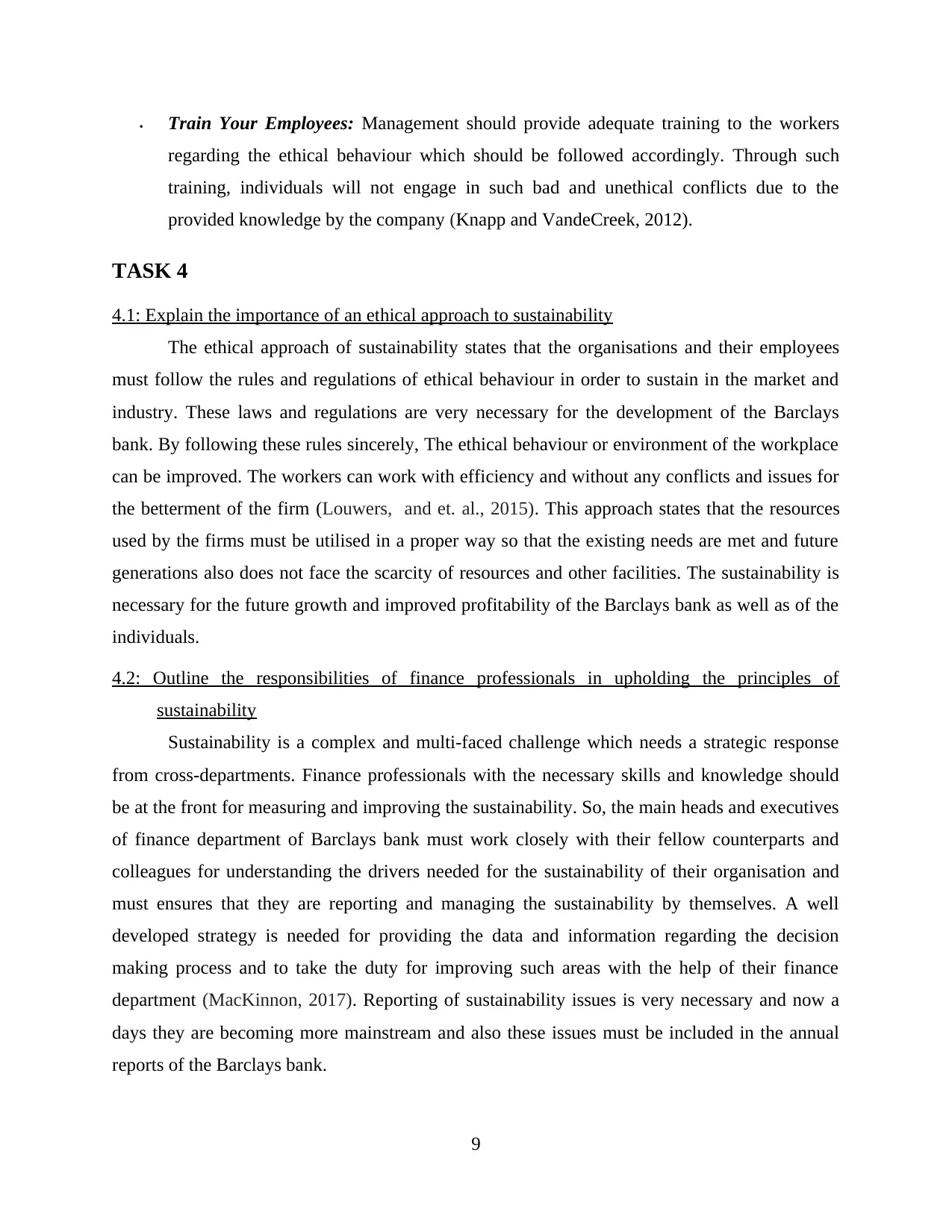
Train Your Employees: Management should provide adequate training to the workers
regarding the ethical behaviour which should be followed accordingly. Through such
training, individuals will not engage in such bad and unethical conflicts due to the
provided knowledge by the company (Knapp and VandeCreek, 2012).
TASK 4
4.1: Explain the importance of an ethical approach to sustainability
The ethical approach of sustainability states that the organisations and their employees
must follow the rules and regulations of ethical behaviour in order to sustain in the market and
industry. These laws and regulations are very necessary for the development of the Barclays
bank. By following these rules sincerely, The ethical behaviour or environment of the workplace
can be improved. The workers can work with efficiency and without any conflicts and issues for
the betterment of the firm (Louwers, and et. al., 2015). This approach states that the resources
used by the firms must be utilised in a proper way so that the existing needs are met and future
generations also does not face the scarcity of resources and other facilities. The sustainability is
necessary for the future growth and improved profitability of the Barclays bank as well as of the
individuals.
4.2: Outline the responsibilities of finance professionals in upholding the principles of
sustainability
Sustainability is a complex and multi-faced challenge which needs a strategic response
from cross-departments. Finance professionals with the necessary skills and knowledge should
be at the front for measuring and improving the sustainability. So, the main heads and executives
of finance department of Barclays bank must work closely with their fellow counterparts and
colleagues for understanding the drivers needed for the sustainability of their organisation and
must ensures that they are reporting and managing the sustainability by themselves. A well
developed strategy is needed for providing the data and information regarding the decision
making process and to take the duty for improving such areas with the help of their finance
department (MacKinnon, 2017). Reporting of sustainability issues is very necessary and now a
days they are becoming more mainstream and also these issues must be included in the annual
reports of the Barclays bank.
9
regarding the ethical behaviour which should be followed accordingly. Through such
training, individuals will not engage in such bad and unethical conflicts due to the
provided knowledge by the company (Knapp and VandeCreek, 2012).
TASK 4
4.1: Explain the importance of an ethical approach to sustainability
The ethical approach of sustainability states that the organisations and their employees
must follow the rules and regulations of ethical behaviour in order to sustain in the market and
industry. These laws and regulations are very necessary for the development of the Barclays
bank. By following these rules sincerely, The ethical behaviour or environment of the workplace
can be improved. The workers can work with efficiency and without any conflicts and issues for
the betterment of the firm (Louwers, and et. al., 2015). This approach states that the resources
used by the firms must be utilised in a proper way so that the existing needs are met and future
generations also does not face the scarcity of resources and other facilities. The sustainability is
necessary for the future growth and improved profitability of the Barclays bank as well as of the
individuals.
4.2: Outline the responsibilities of finance professionals in upholding the principles of
sustainability
Sustainability is a complex and multi-faced challenge which needs a strategic response
from cross-departments. Finance professionals with the necessary skills and knowledge should
be at the front for measuring and improving the sustainability. So, the main heads and executives
of finance department of Barclays bank must work closely with their fellow counterparts and
colleagues for understanding the drivers needed for the sustainability of their organisation and
must ensures that they are reporting and managing the sustainability by themselves. A well
developed strategy is needed for providing the data and information regarding the decision
making process and to take the duty for improving such areas with the help of their finance
department (MacKinnon, 2017). Reporting of sustainability issues is very necessary and now a
days they are becoming more mainstream and also these issues must be included in the annual
reports of the Barclays bank.
9
⊘ This is a preview!⊘
Do you want full access?
Subscribe today to unlock all pages.

Trusted by 1+ million students worldwide
1 out of 14
Related Documents
Your All-in-One AI-Powered Toolkit for Academic Success.
+13062052269
info@desklib.com
Available 24*7 on WhatsApp / Email
![[object Object]](/_next/static/media/star-bottom.7253800d.svg)
Unlock your academic potential
Copyright © 2020–2025 A2Z Services. All Rights Reserved. Developed and managed by ZUCOL.





